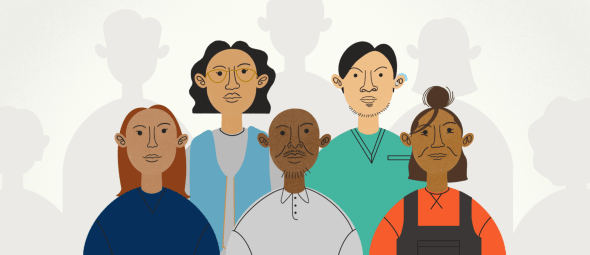Job Quality and Employer Practices: Evidence from B Corporations
A new WorkRise report explores how employer practices related to job quality differ between certified B Corporations and similar firms, revealing insights into worker benefits, firm outcomes, and strategies to improve job quality.
Read full report
A new WorkRise report explores how employer practices related to job quality differ between certified B Corporations and similar firms, revealing insights into worker benefits, firm outcomes, and strategies to improve job quality.
Grantmaking and Partnerships
Led by a cross-sector Leadership Board that is ideologically diverse and representative of often-siloed groups, WorkRise invests in research on policies, programs, and practices that have the potential to accelerate economic security and mobility for low-wage workers. We fund analyses and the creation of data that shed light on labor market barriers, trends, and opportunities. And we engage in strategic partnerships that help advance evidence-based solutions in support of our mission. Learn more about our most recent request for proposals and how you can collaborate with WorkRise.
The Latest
In Depth

Economic context, Care work, Scheduling
Feature
Last updated on October 24, 2024
Segregation in the Low-Wage Workforce
Over the past 50 years, the composition of the low-wage workforce has changed: more than half of low-wage workers are now people of color, up from just 20 percent in 1971. Today, Black, Latino, and women workers are more likely to be segregated into worse-quality and lower-paying jobs.
WorkRise Research
The Latest

Employer practices, Scheduling
Last updated on January 07, 2025
Research Summary
What Does it Take for a Fair Scheduling Policy to Work in Practice?
A study of service workers found many are unaware of their rights and face pressure to waive protections, highlighting the need for enhanced enforcement and education funding and more explicit language to prevent loopholes.

Employer practices, Support during upskilling , Young workers
Last updated on November 19, 2024
Video
WorkRise Shorts: Overcoming Racial Disparities in Manufacturing Recruitment and Training Programs
Can a new local manufacturing workforce development program that targets workers who are not traditionally engaged in the sector overcome racial disparities in its hiring and wage rates?
Last updated on November 19, 2024
In Depth
Economic context
Last updated on November 20, 2024
WorkRise Manufacturing and Supply Chains Projects
WorkRise has invested in several projects that provide data-driven solutions for policymakers, employers, advocates, and practitioners committed to revitalizing US manufacturing jobs. These initiatives aim to generate meaningful mobility, particularly for younger workers, people of color, and women, who face low wages and systemic barriers to opportunity in this critical field.
Last updated on November 20, 2024
Research
Employer practices
Report
Last updated on May 21, 2024
IKEA Self-Scheduling Intervention: Baseline Report
Widespread unpredictability in work scheduling leads to decreased job satisfaction, higher turnover rates, economic instability, and compromised worker health. To address these challenges, IKEA partnered with The Shift Project to develop a Self-Scheduling Intervention for its hourly workers to give them greater control over their shifts. They selected intervention and comparison stores to measure its impact on worker and business outcomes, and over four years, held weekly meetings to strategize and analyze data. This report contextualizes self-scheduling research, delves into pre-intervention conditions, introduces new features, outlines the research design, and explores future directions.
Grantee Research
Economic context, Economic development
Report
Last updated on May 14, 2024
Aligning Workforce and Economic Development to Benefit Workers
In this report, WorkRise examines what we know about the impacts of the workforce development and economic development fields and their implications for equitable economic outcomes for low-wage workers, especially Black individuals and other people of color who have faced systematic challenges in economic mobility.
WorkRise Research
Employer practices, Workers in the South
Report
December 13, 2023
Temporary Staffing Industry Testing Report
The temporary staffing industry is a $186 billion sector. The National Legal Advocacy Network team used matched-pair testing in Harris County, Texas, and Nashville, Tennessee, to generate evidence on potentially unlawful employment practices in this industry and found widespread racial and gender discrimination in access to work. These tests showed that agencies offered fewer job opportunities, lower wages, and less frequent follow-ups to workers who were women and/or Black than they did to Latinx workers and men.
Grantee Research
Economic context, Scheduling, Mental health
Report
November 20, 2023
Quantifying the Costs of Rising Unemployment
Rising unemployment brings significant costs to workers, their families, social outcomes, and the economy at-large. The contemporary tight labor market provides a good opportunity for researchers to better understand the benefits of low unemployment and thus the risks of high unemployment.
WorkRise Research


